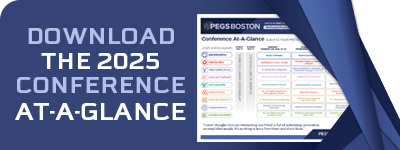Cambridge Healthtech Instituteの第15回年次
Driving Clinical Success in Antibody-Drug Conjugates
抗体薬物複合体(ADC)の臨床的成功の推進
Designing the Magic Bulle
特効薬の設計
2025年5月15日 - 16日 EDT(米国東部標準時・夏時間)
Sunday, May 11
1:00 pmMain Conference Registration
2:00 pmRecommended Pre-Conference Short Course
SC2: Safety & Efficacy of Bispecifics and ADCs
*Separate registration required. See short course page for details.
Tuesday, May 13
6:30 pmRecommended Dinner Short Course
SC7: Nuts and Bolts of Building a Radiopharmaceutical Therapy Agent
*Separate registration required. See short course page for details.
Thursday, May 15
7:45 amRegistration and Morning Coffee
DEGRADER-ANTIBODY CONJUGATES
Degrader-Antibody Conjugates (DACs) Unlock Heterobifunctional Degraders through mAb-Like Pharmacokinetics and Excellent in vivo Efficacy
 Jonas Helma-Smets, PhD, Founder & CSO, Tubulis GmbH
Jonas Helma-Smets, PhD, Founder & CSO, Tubulis GmbH
New ADC payload strategies are needed to address emerging drug resistance and limited treatment durability. Degrader-Antibody Conjugates (DACs) could significantly expand the number of druggable payload targets; however, conjugation and identification of suitable degraders remain challenging. Here, we report a new DAC platform ensuring excellent DAC stability antibody-mediated delivery of functional degraders enabling long-lasting responses even after single-dose injections in preclinical animal models.
The Design and Optimization of Degrader-Antibody Conjugates
 Stephanie M. Monson, PhD, Principal Scientist & Group Leader, Conjugation & Chemical Biology, Genentech Inc.
Stephanie M. Monson, PhD, Principal Scientist & Group Leader, Conjugation & Chemical Biology, Genentech Inc.
Degrader Antibody Conjugates (DACs) represent a novel therapeutic approach that combines the specificity of antibodies with the potency of protein degraders. The design and optimization of DACs involve careful consideration of factors such as antibody selection, linker chemistry, and TPD potency. By precisely engineering these components, researchers aim to create highly effective and selective DACs for the treatment of various diseases, including cancer.
PROxAb Shuttle: A Plug & Play Solution for Targeted Antibody-Mediated Degrader Delivery
 Hendrik Schneider, PhD, Principal Scientist, Merck KGaA, Darmstadt, Germany
Hendrik Schneider, PhD, Principal Scientist, Merck KGaA, Darmstadt, Germany
Targeted protein degradation has emerged as a promising therapeutic strategy for addressing challenging molecular pathologies. However, achieving tissue selectivity remains challenging. The PROxAb Shuttle approach introduces a non-covalent platform for antibody-mediated targeted delivery of degraders. By enhancing pharmacokinetics and prolonging degrader half-lives from hours to days, this system aims to improve the selectivity and efficacy of tumor-targeting therapies, facilitating significant anti-tumor responses in vivo.
10:00 amSponsored Presentation (Opportunity Available)
10:30 amCoffee Break in the Exhibit Hall with Poster Viewing
11:15 amTransition to Plenary Fireside Chat
PLENARY FIRESIDE CHAT
Riding the Next Biotech Wave-Trends in Biotech Investments, Partnering, and M&As
 Jakob Dupont, MD, Executive Partner, Sofinnova Investments
Jakob Dupont, MD, Executive Partner, Sofinnova Investments
- Emerging Biotherapeutic Modalities, Technologies and Innovations- ADCs, radiopharmaceuticals, GLP-1, AI, machine learning, and other exciting trends to watch
- Introduction to different strategies for investments, M&As, partnering, licensing etc.
- Investing in platforms versus assets
- Advice on funding options for start-ups, early to late stage clinical programs, etc.
12:25 pmLuncheon in the Exhibit Hall and Last Chance for Poster Viewing
NOVEL PAYLOADS AND MECHANISMS OF ACTION
Reviewing the Development of DXd ADC Technology & the Latest Clinical Results
 Akiko Zembutsu, PhD, Senior Director, Group I, Discovery Research Laboratories I, R&D Division, Daiichi Sankyo Co., Ltd.
Akiko Zembutsu, PhD, Senior Director, Group I, Discovery Research Laboratories I, R&D Division, Daiichi Sankyo Co., Ltd.
Trastuzumab deruxtecan, utilizing DXd ADC technology, is transforming HER2 treatment by demonstrating strong efficacy not only in HER2-high, but also in HER2 ultra-low cases. Daiichi Sankyo is applying this DXd ADC technology to various targeted antibodies and advancing clinical trials. In my presentation, I will introduce the unique features of the technology and present the latest nonclinical and clinical data.
Development of Glucocorticoid Receptor Modulator ADC for Inflammatory Diseases
 Michael McPherson, PhD, Research Fellow, Antibody Drug Conjugates, Technology and Therapeutic Platforms, AbbVie
Michael McPherson, PhD, Research Fellow, Antibody Drug Conjugates, Technology and Therapeutic Platforms, AbbVie
Glucocorticoids (GCs) are potent anti-inflammatory drugs, but their widespread use is limited by systemic side effects. To address this, we have developed Glucocorticoid Receptor Modulator (GRM) Antibody-Drug Conjugates (ADCs) for inflammatory diseases. By precisely targeting the drug, ADCs aim to minimize systemic exposure and reduce adverse effects, while maximizing therapeutic efficacy. This innovative approach holds significant promise for treating a variety of inflammatory conditions, including autoimmune diseases and allergic disorders.
Clinical Performance Evaluation of TOPO1 ADCs
Rakesh Dixit, PhD, DABT, President & Founder, Bionavigen Oncology, LLC and Regio Biosciences
- Why TOPO1 ADCs are not succeeding in lung cancer
- What's next in the horizon for TOPO1 ADCs?
3:30 pmSponsored Presentation (Opportunity Available)
4:00 pmNetworking Refreshment Break
A Novel Antibody (Oligo)-Drug Conjugate to Treat Cancer
 David M. Evans, PhD, Head of Discovery, Research, Sirnaomics Inc.
David M. Evans, PhD, Head of Discovery, Research, Sirnaomics Inc.
We have designed a novel siRNA containing gemcitabine in its backbone. This has demonstrated potent activity in preclinical models of pancreatic cancer, NSCLC and TNBC. This talk will demonstrate the synthesis and activity when conjugated to cetuximab for delivery to tumors in vivo.
FORCE Platform Enables Effective Delivery of Therapeutics for Rare Neuromuscular Disorders
 Stefano Zanotti, PhD, Head, Neuromuscular Research, Dyne Therapeutics Inc.
Stefano Zanotti, PhD, Head, Neuromuscular Research, Dyne Therapeutics Inc.
FORCE is a modular platform which enables delivery of chemically diverse therapeutic payloads with widespread distribution to muscle and CNS. The FORCE platform is translating into the clinic with the ACHIEVE and DELIVER trials for DM1 and DMD, respectively. These encouraging clinical data and strong preclinical efficacy in FSHD and Pompe disease models support the potential of FORCE to address neuromuscular disorders with high unmet medical needs.
5:30 pmClose of Day
Friday, May 16
7:15 amRegistration Open
INTERACTIVE DISCUSSIONS
Interactive Discussions are informal, moderated discussions, allowing participants to exchange ideas and experiences and develop future collaborations around a focused topic. Each discussion will be led by a facilitator who keeps the discussion on track and the group engaged. To get the most out of this format, please come prepared to share examples from your work, be a part of a collective, problem-solving session, and participate in active idea sharing. Please visit the Interactive Discussions page on the conference website for a complete listing of topics and descriptions.
Opportunities for Protein Engineering in ADC Development
Greg M. Thurber, PhD, Associate Professor, Chemical Engineering & Biomedical Engineering, University of Michigan
Antibody drug conjugates are showing tremendous promise in the clinic with multiple FDA approvals and clinical-state compounds. A significant effort has improved the linker, payload, and conjugation strategies, but less emphasis has been placed on engineering the protein. In this talk, we will present strategies for antibody engineering including the use of multivalent and/or biparatopic antibodies, epitope selection with antibody/ADC combinations, and Fc-engineering to improve the therapeutic window.
ENGINEERING ADCS - INCREASING THERAPEUTIC WINDOW, INTERNALIZATION, AFFINITY, AND TUMOR SELECTIVITY
Protein Engineering Strategies to Improve the Efficacy of Antibody-Drug Conjugates
 Greg M. Thurber, PhD, Associate Professor, Chemical Engineering & Biomedical Engineering, University of Michigan
Greg M. Thurber, PhD, Associate Professor, Chemical Engineering & Biomedical Engineering, University of Michigan
Antibody-drug conjugates are showing tremendous promise in the clinic with multiple FDA approvals and clinical-state compounds. A significant effort has improved the linker, payload, and conjugation strategies, but less emphasis has been placed on engineering the protein. In this talk, we will present strategies for antibody engineering including the use of multivalent and/or biparatopic antibodies, epitope selection with antibody/ADC combinations, and Fc-engineering to improve the therapeutic window.
Reversible Chemical Modification of Antibodies: Modulating FcγR Binding to Maintain Anti-Tumor Activity and Mitigate Systemic Immune Activation
 Philip N. Moquist, PhD, Scientist, Chemistry, Pfizer Oncology
Philip N. Moquist, PhD, Scientist, Chemistry, Pfizer Oncology
Here we present a method for tuning effector function inspired by antibody-drug conjugates. This methodology uses conjugation of polyethylene glycol (PEG) to native cysteines of an antibody to impair FcgR binding. Attenuated effector function can be permanent or restored through a de-conjugation process. Impacts of reversible PEGylation were assessed and applied to an agonist CD40 antibody. The PEGylated constructs displayed significant reductions in systemic cytokine production in vivo, while retaining efficacy.
Exploring the Design of Selectively-Targeted Payloads with Quantitative Systems Pharmacology
 Eshita Khera, PhD, Principal Scientist II, Modeling & Simulation & PK Sciences, Novartis BioMedical Research
Eshita Khera, PhD, Principal Scientist II, Modeling & Simulation & PK Sciences, Novartis BioMedical Research
Over 90% of clinical ADCs use pan-cytotoxic payloads, but there is emerging interest in selectively-targeted payloads such as protein inhibitors and degraders. However, designing ADCs with non-traditional payloads is even more complex than cytotoxic ADCs, and challenging to optimize empirically. The proposed talk will highlight some new guiding principles for designing non-traditional ADCs, guided by vignettes of integrated lab-to-model workflows powered by Quantitative Systems Pharmacology.
Enhancing ADCs Both within and outside the Tumor with Sutro’s Platform Technologies Leads to a Higher Therapeutic Index
 Hanspeter Gerber, PhD, CSO, Sutro Biosciences
Hanspeter Gerber, PhD, CSO, Sutro Biosciences
The recent renaissance of ADCs was enabled by the dramatic increase in their therapeutic indexes, which can be achieved in two ways: either by making ADCs safer outside the tumors, resulting in an increased maximum tolerated dose-or inside the tumor, by improving their potency or reducing resistance formation. I will discuss several examples of how we achieved this goal with our next-generation Topo1 ADC platform.
10:30 amNetworking Coffee Break
ADC Designs with Tumor-Selective Linkers and Novel ProAlk Payload for Differentiated Tolerability Profiles
 Jutta Deckert, PhD, Vice President, Research & Development, Iksuda Therapeutics
Jutta Deckert, PhD, Vice President, Research & Development, Iksuda Therapeutics
This presentation aims to 1) highlight stable bioconjugation approaches for increased ADC stability in vitro and in vivo, 2) describe tumor-selective linker designs that are aimed to improve the therapeutic index of ADCs by altering the toxicity profile and increasing tolerability, and 3) introduce ProAlk as a novel ADC payload with a differentiated mechanism of action and provide preclinical proof-of-concept studies.
Novel mavg-MMAU Linker-Payload Improves Both Efficacy and Tolerability of Auristatin ADCs
 Juhani Saarinen, CEO, Glykos Finland Ltd.
Juhani Saarinen, CEO, Glykos Finland Ltd.
- Auristatin glycoside ADCs with stabilized glycopeptide linker provide exceptionally wide therapeutic window and improved potency. Preclinical validation of CD33, TYRP-1, and HER2 targeting MMAU ADCs.
- Next-generation auristatin ADCs were developed based on MMAU (glucuronylated prodrug of MMAE) enabling both DAR=4 and DAR=8 ADCs with high potency.
- The novel mavg-MMAU linker-payloads enabled simultaneous improvements in both in vivo efficacy and tolerability; bystander efficacy and resistance to MDR drug efflux; and improved PK and lower off-target toxicity compared to vedotin ADCs.
- The improved linker was further applied to novel exatecan linker-payloads.
12:30 pmClose of Summit
* 不測の事態により、事前の予告なしにプログラムが変更される場合があります。
アジェンダ・講演者・スポンサー更新
2025年 プログラム
表示する:

工学ストリーム

腫瘍ストリーム

多重特異性ストリーム

免疫療法ストリーム

発現ストリーム

分析法ストリーム

免疫原性ストリーム

新興治療ストリーム

機械学習ストリーム



















